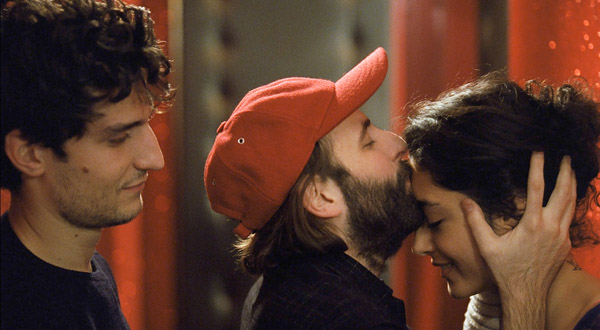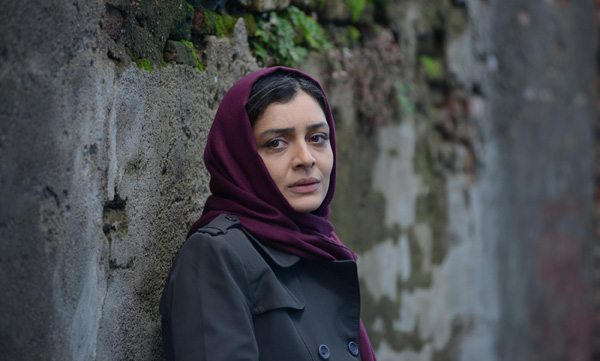The premieres of films by internationally known directors attracted most of the coverage at Cannes: consider the critical love that was bestowed upon Todd Haynes’s Carol or the thumping Gus van Sant received for The Sea of Trees. Big names were represented from all over: Asian auteurs (Jia Zhang-ke and Hou Hsiao-Hsien) and the big three from Italy: Nanni Moretti, Matteo Garrone, and Paolo Sorrentino. Yet what may go overlooked is that a quarter of the entire festival is made up of works by debut directors. For every old guard or up-and-comer, there’s a new kid on the block.
As discussed earlier, the Grand Prix–winning Son of Saul made a significant impact, as did The Here After, in which a small town won’t forget or forgive a teen for his crime, and the genre bender Les Cowboys. All three were among the strongest films here. The latter is making the festival rounds, appearing soon at the New York Film Festival. The following are four more to add to the new-directors-to-keep-an-eye-on list.
One first-timer is already well known: French actor Louis Garrel (an annual presence here), who brought Two Friends to the International Critics’ Week program. He also costars, playing a type he has well honed over the past decade, the sexual free spirit hipster/slacker. In this slice of late 20s/early 30s ennui and wanderlust, Abel (Garrel) meddles in the affairs of friend Clément, a film extra who doesn’t need a wing man so much as a therapist.
The poised Abel, a wannabe poet, has the wild, tousled hair to match. His physical opposite, the balding and schlumpy Clément, myopically pursues the stunning and self-aware Mona, popping up at her fast-food workplace and pleading with puppy dog eyes for a date. As though borrowing a plot from a boulevard comedy, Abel takes on the role of matchmaker, a plan that backfires. Also, unbeknownst to the two self-centered dudes, Mona is in prison (the reason, unknown). She’s allowed to work in the city but must be back before curfew.
Shot in the heart of Paris, this is one of the few works in the festival that was actually filmed on 35mm, and gorgeously so. An elegant score by Philippe Sarde adds an extra of touch of class. Garrel is, of course, the son of director Philippe Garrel, whose latest film, In the Shadow of Women, also appeared in the festival. For le père, the events and reverberations of May 1968 have resonated in much of his work. Regular Lovers from 2005 was a wistful ode and memorial to the era’s promise. Clearly, le fils is treading a different path. He good-naturedly, with a wink, sends up the generational divide, acknowledging the divergent priorities of kids today from those of the marching protestors 50 years ago. In Friends, the trio, more as a lark, take to the streets, but as extras for a movie about the May ’68 unrest. The burning prop cars are just for show, too.
Often the action by the three amigos is exuberant, yet there’s little novel about the aiding-and-abetting bromantic setup. This is certainly holds true for the casting of Vincent Macaigne as Clément, a role identical to others Macaigne has taken on in Stubborn, Tonnerre, and The Age of Panic. One would think that as a character actor, he would play a variety of roles. Instead, he has been typecast like a contract player in the old Hollywood studio system. As Mona, Golshifteh Farahani makes this movie matter. In a scene where Mona is pulled off of a train by Abel and Clément—thus breaking her curfew—she has a meltdown on the station platform. Suddenly, something urgently matters.
Iran was represented by the misty and moody Nahid, a domestic film noir, though it’s mostly set in the haze of day. (It was shot in the gray northern town of Anzali, along the Caspian Sea.) One of its fleeting images succinctly captures the essence of the relationship between a well-meaning but self-centered and entitled mother, Nahid, and her layabout, hood-in-the-making son, Amir Reza (Milad Hasan Pour). In a brief moment, the thirtysomething women cradles the sleeping boy in her arms. It’s a fleeting reference to any number of sculptures/paintings of the Pietà and an anomaly, an elegant composition among the grit in this no-frills, street-level slice of social realism.
Whether putting off an ardent suitor or forgoing paying the rent, Nahid’s something of an impulsive wheeler-dealer: promising, bargaining, lying, and avoiding the consequences. Most of her money goes toward her son’s tuition at a hoity-toity private school, where his grades have slumped. Amir Reza takes after his father, a no-good heroin addict whom Nahid divorced two years earlier. Instead of attending school, Amir Reza plays hookey and hightails it to the neighborhood gambling den. According to the terms of her divorce, Nahid has custody of her son as long as she doesn’t remarry.
Both the audience and Nahid may have a hard time keeping her evasive stories straight. The main question is how long she can maintain her numerous lies, especially when she marries a widower with a shy, obedient five-year-old daughter: the moneyed and blue-eyed Masood (Pejman Bazeghi). He knows nothing about her son or previous marriage, though he questions why she insists on a temporary marriage license, with the option to renew; if Nahid sees a loophole, she takes it. (Masood owns a hotel, so she’s definitely trading up.)
Avoiding melodramatic histrionics, first-time director Ida Panahandeh gracefully directs her cast moment by moment, maintaining an air of mystery as to what’s behind Nahid’s actions—even though it’s a slightly overwritten role—and the storyline builds up to a life-changing decision, not unlike a film by Jean-Pierre and Luc Dardenne. Panahandeh’s most winning asset is the star-turn by the striking actress Sareh Bayat (many filmgoers will know her as the errant caregiver in another martial drama, the Oscar-winning A Separation). Due to a great extent to her coolly compelling performance, Nahid won the Promising Future Prize, given by the jury of the Un Certain Regard section, which was headed by actress/filmmaker Isabella Rossellini.
For the past three years, there has been a no-frills, gritty and ever-timely exploration of contemporary, and at times deadly, immigration screening somewhere in Cannes. La Jaula de Oro (2013) follows three teenagers from Central America who undergo a catalogue of catastrophes on their way north: coyotes, robbers, sex traffickers, and vigilantes. In contrast to that film’s stark portrayal, last year’s French-made Hope lived up to its title as two young lovers from West Africa head to Europe. This year, Italian-American filmmaker Jonas Carpignano keeps to the middle of the road in Mediterranea: his lead character, from Burkina Faso, is less wide-eyed and more pragmatic about his new home country. Like the other films, this film is populated by nonprofessional actors, and Carpignano has discovered a genuine performer with charisma and confidence in Koudous Seihon.
In the beginning, Abas (Alassane Sy) promises his best friend Ayiva (Seihon) that another pal who has landed in Italy can find work for them there to pay for their clandestine watery crossing. A single dad, Ayiva leaves his seven-year-old daughter in care of his sister, and Carpignano economically and excitingly covers the dangerous, stormy Mediterranean crossing on a rickety boat within the first 20 minutes, where social realism meets thriller. Afterwards, the film settles down in Southern Italy in the Calabrian town of Rosarno and builds up to a reenactment of the 2010 riots between immigrants and the police. (That’s where Carpignano first met Seihon while researching for his short film, “A Chjàna,” which he has expanded into this film.) Living in legal limbo, Ayiva and Abas have three months to procure residency paperwork.
The striving Ayiva is congenial, considerate, and kind, so it’s a shock when he steals from an elderly Italian pensioner, but that’s a blip in his otherwise straight-arrow behavior. He finds honest but hard work picking oranges, while the more impatient Abas turns to trading stolen goods. (Two women in the male-dominated African émigré community turn to prostitution.)
What mainly concerns Carpignano is Ayiva’s curiosity about his new home; Rosarno becomes less a town of “others” and more of a nuanced portrayal of Italians. As expected, there are xenophobic hooligans on the streets, but Carpignano spotlights those who reach out and help Ayiva and his shantytown neighbors, all of whom have left behind their families. Meet Mama Africa (Norma Ventre), a white-haired stocky women in her late 70s who takes on the role of substitute mother, preparing a home-cooked feast of pasta and teaching the young African men Italian etiquette (hats off when at the dinner table). Even Ayiva’s boss, who’s primary concern is the bottom line, invites Ayiva home for a family dinner.
Leave it to rowdy Americans to bring energy and bad behavior to the party in the lively Krisha, set during a tension-filled Thanksgiving gathering. (Is there really any other kind?) A combination of Jonathan Demme’s jittery Rachel Getting Married and Alejandro González Iñárritu’s energetic Birdman, this indie has verve to spare and features a razor-sharp cast that’s largely nonprofessional. Unlike those two films, Krisha mixes up the tempo and the immersive soundtrack.
For his cast, writer/director Trey Edward Shults keeps it all in the family, even shooting the film at his parents’ home—a decision that pays off. He also steps in front of the camera as Trey, a graduate student who braces himself for the visit of his mother, Krisha, whom he hasn’t seen in years. (It’s pronounced Kreesha, with a long e; it’s set in Texas, darlin’.) Shults’s real-life mom plays his aunt, and his aunt, Krisha Fairchild, plays his mom. It’s not as confusing as it sounds, though viewers won’t get the names of everyone in the sprawling family reunion.
After a decade-long absence, the sixtyish Krisha is off booze and drugs, but when she promises she’s going to make up for lost time, viewers will have a feeling that a reckoning is a comin’. Everyone has heard it before and is anxiously waiting for her to fall apart. Krisha immediately feels the pressure, profusely apologizing and blaming her late arrival on her faulty GPS (strike one). The handheld camera captures all of the commotion in situ, from the guys watching football and horsing around to the preparations in the kitchen.
Sure, Krisha’s not original when it comes to story—somehow, you know that the humongous turkey roasting in the oven won’t make it to the dinner table. However, the actors never wait for a scene to happen, as the self-conscious cast Rachel seemed to have. The dialogue can sometimes be too spot-on; one relative, not believing a contrite word Krisha says, tells her outright that she’s an “abandoner.” However, in the big emotional group outburst, the cast spews out the dialogue (audiences will pray that the film is truly fictional), and Fairchild lets it all hang out. Some four decades after she trekked to Los Angeles for an acting career, she has arrived, giving the steely Isabelle Huppert competition.
Of the four films mentioned, only Krisha has an American distributor so far. There is such a glut of films on the festival circuit that none of the four will be stopping by Telluride, Toronto, or New York this fall. Still, keep an eye out for them. Krisha, however, will move on to the BFI London Film Festival, where it will compete for the Sutherland Award for best first feature.



















Leave A Comment